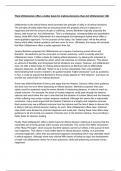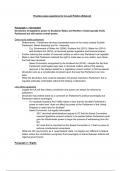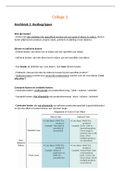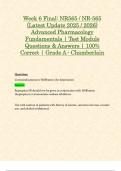'Rule Utilitarianism offers a better basis for making decisions than Act Utilitarianism' (30)
Utilitarianism is the ethical theory which promotes the principle of utility in all ethical decisions.
The principle of Utility states that we should promote the greatest amount of pleasure or
happiness and limit the amount of pain or suffering. Jeremy Bentham originally proposed the
theory, later known as, Act Utilitarianism. This is a teleological, consequentialist and quantitative
theory, while Mill's Rule Utilitarianism is a deontological and teleological hybrid which offers a
more qualitative approach. For the purpose of this essay, the "better basis" will be the ethical
theory which offers clearer guidance and less room for error. Ultimately, this essay will conclude
that Rule Utilitarianism offers a better approach than Act.
Jeremy Bentham proposed Act Utilitarianism as a means of achieving social reform and
liberation. He wanted to put the onus back on human autonomy, which is exactly what Act
Utilitarianism does. It offers a basis for making ethical decisions, by allowing the individual to
use their judgement to decide the action which will maximise or minimise pleasure. This allows
an element of flexibility and recognises that all situations are unique. However, Act Utilitarianism
does not offer a better basis for making ethical decisions as Bentham fails to differentiate
between pleasures. As Mill said, "better to be a human dissatisfied, than a pig satisfied",
demonstrating that humans needed to be guided towards "higher pleasures" such as academia.
In fact, it could be argued that Bentham's theory simply appeals to "thrill seekers", and does not
provide any useful basis for making decisions.
Some may defend Bentham's theory and argue that the Hedonic Calculus offers clear guidance
and less room for error when assessing an ethical decision. Bentham proposed, that each
option could be assessed using the seven strands of measuring pleasure, in order to reach an
overall outcome. For example, the issue of nuclear weapons could pass through the hedonic
calculus and would allow the user to see that that the duration of nuclear fallout and the intensity
of that suffering may render nuclear weapons unethical. Although this seems like a reasonable
conclusion, many would argue that the Hedonic Calculus is a lengthy and subjective process.
Each person may see a different outcome from the calculus and the time it takes to discuss this
is likely to halt any ethical decision making. As such, Rule Utilitarianism offers clear, historical
rules which were devised to promote happiness and avoid pain. Having these rules offers clear
guidance to all and avoids any aspects of human error in the hedonic calculus, thus providing a
better basis for decision making.
Finally, Rule Utilitarianism offers a better basis for ethical decision making as it ensures that the
vulnerable and minority groups within society are protected. This comes from Mill's introduction
of the "Boss Principle", which ensures that thrill seekers cannot hurt others in the pursuit of their
own happiness. This allows a much better basis for ethical decision making, as it promotes
universal happiness, rather than just personal happiness (something which may ultimately result
in ethical egoism). Although some may criticise Mill's theory of being too rigid, the development
of weak rule utilitarianism allows for human autonomy, whilst still preserving universal human
happiness.
Utilitarianism is the ethical theory which promotes the principle of utility in all ethical decisions.
The principle of Utility states that we should promote the greatest amount of pleasure or
happiness and limit the amount of pain or suffering. Jeremy Bentham originally proposed the
theory, later known as, Act Utilitarianism. This is a teleological, consequentialist and quantitative
theory, while Mill's Rule Utilitarianism is a deontological and teleological hybrid which offers a
more qualitative approach. For the purpose of this essay, the "better basis" will be the ethical
theory which offers clearer guidance and less room for error. Ultimately, this essay will conclude
that Rule Utilitarianism offers a better approach than Act.
Jeremy Bentham proposed Act Utilitarianism as a means of achieving social reform and
liberation. He wanted to put the onus back on human autonomy, which is exactly what Act
Utilitarianism does. It offers a basis for making ethical decisions, by allowing the individual to
use their judgement to decide the action which will maximise or minimise pleasure. This allows
an element of flexibility and recognises that all situations are unique. However, Act Utilitarianism
does not offer a better basis for making ethical decisions as Bentham fails to differentiate
between pleasures. As Mill said, "better to be a human dissatisfied, than a pig satisfied",
demonstrating that humans needed to be guided towards "higher pleasures" such as academia.
In fact, it could be argued that Bentham's theory simply appeals to "thrill seekers", and does not
provide any useful basis for making decisions.
Some may defend Bentham's theory and argue that the Hedonic Calculus offers clear guidance
and less room for error when assessing an ethical decision. Bentham proposed, that each
option could be assessed using the seven strands of measuring pleasure, in order to reach an
overall outcome. For example, the issue of nuclear weapons could pass through the hedonic
calculus and would allow the user to see that that the duration of nuclear fallout and the intensity
of that suffering may render nuclear weapons unethical. Although this seems like a reasonable
conclusion, many would argue that the Hedonic Calculus is a lengthy and subjective process.
Each person may see a different outcome from the calculus and the time it takes to discuss this
is likely to halt any ethical decision making. As such, Rule Utilitarianism offers clear, historical
rules which were devised to promote happiness and avoid pain. Having these rules offers clear
guidance to all and avoids any aspects of human error in the hedonic calculus, thus providing a
better basis for decision making.
Finally, Rule Utilitarianism offers a better basis for ethical decision making as it ensures that the
vulnerable and minority groups within society are protected. This comes from Mill's introduction
of the "Boss Principle", which ensures that thrill seekers cannot hurt others in the pursuit of their
own happiness. This allows a much better basis for ethical decision making, as it promotes
universal happiness, rather than just personal happiness (something which may ultimately result
in ethical egoism). Although some may criticise Mill's theory of being too rigid, the development
of weak rule utilitarianism allows for human autonomy, whilst still preserving universal human
happiness.











